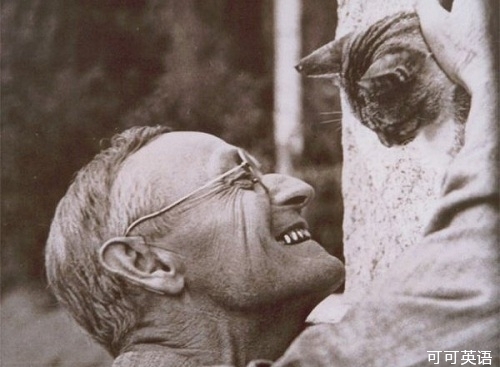(单词翻译:单击)
名著阅读
Siddhartha had learned to trade, to use his power over people, to enjoy himself with a woman, he had learned to wear beautiful clothes, to give orders to servants, to bathe in perfumed waters. He had learned to eat tenderly and carefully prepared food, even fish, even meat and poultry, spices and sweets, and to drink wine, which causes sloth and forgetfulness. He had learned to play with dice and on a chess-board, to watch dancing girls, to have himself carried about in a sedan-chair, to sleep on a soft bed.
But still he had felt different from and superior to the others; always he had watched them with some mockery, some mocking disdain, with the same disdain which a Samana constantly feels for the people of the world. When Kamaswami was ailing, when he was annoyed, when he felt insulted, when he was vexed by his worries as a merchant, Siddhartha had always watched it with mockery. Just slowly and imperceptibly, as the harvest seasons and rainy seasons passed by, his mockery had become more tired, his superiority had become more quiet. Just slowly, among his growing riches, Siddhartha had assumed something of the childlike people's ways for himself, something of their childlikeness and of their fearfulness.
And yet, he envied them, envied them just the more, the more similar he became to them. He envied them for the one thing that was missing from him and that they had, the importance they were able to attach to their lives, the amount of passion in their joys and fears, the fearful but sweet happiness of being constantly in love. These people were all of the time in love with themselves, with women, with their children, with honours or money, with plans or hopes. But he did not learn this from them, this out of all things, this joy of a child and this foolishness of a child; he learned from them out of all things the unpleasant ones, which he himself despised. It happened more and more often that, in the morning after having had company the night before, he stayed in bed for a long time, felt unable to think and tired. It happened that he became angry and impatient, when Kamaswami bored him with his worries. It happened that he laughed just too loud, when he lost a game of dice.
His face was still smarter and more spiritual than others, but it rarely laughed, and assumed, one after another, those features which are so often found in the faces of rich people, those features of discontent, of sickliness, of ill-humour, of sloth, of a lack of love. Slowly the disease of the soul, which rich people have, grabbed hold of him.Like a veil, like a thin mist, tiredness came over.
席特哈尔塔学会了做生意,学会了对人们行使权力,学会了与女人寻欢作乐。他学会了穿华衣美服,使唤奴仆,在香气袭人的水里洗澡。他学会了享用精心烹调的饭菜,烹用鸡鸭鱼肉、调味品和甜点、饮用使人懒散、健忘的酒。他学会了掷骰子、下棋、看舞蹈、坐轿子和睡软床。
但是,他仍然和别人不一样,他感到自己比他们优越,看他们时总是略带嘲讽,略带揶揄的轻蔑,这正是沙门对俗人始终怀有的那种轻蔑。每当卡马斯瓦密身体不舒服,生气发怒,感到受了侮辱,受商人的种种烦恼困扰时,席特哈尔塔总是怀着嘲讽袖手旁观。不过,随着收获季节和雨季过去,他的嘲讽慢慢地不知不觉地减弱了,他的优越感也有所收敛。随着他的财富日益增长,席特哈尔塔本人也染上了那种孩子般俗人的一些特点,染上了他们的孩子气和谨小慎微。
而且,他羡慕他们,他跟他们越相像,就越羡慕他们。而他羡慕的正是他自己缺乏而他们却拥有的东西,那就是他们能使他们的生活显得十分重要,他们对欢乐与恐怕的激情,以及他们演变的不安而又甜蜜的幸福。这些人不断地迷恋自己,迷恋女人,迷恋他们的孩子,迷恋名或利,迷恋种种计划或希望。但是有一占他不是向他们学到的,那就是孩子般的快乐和孩子般的愚蠢;他向他们学到的恰恰是他自己很瞧不起的讨厌东西。于是,越来越多地出现这样的情况:他在参加了一个欢乐的晚会之后早上迟迟不起床,感到昏头昏脑和十分困乏。当卡马斯瓦密诉说自己的烦恼而使他感到无聊时,他往往生气发怒和烦躁不安。
他掷骰子赌输了钱,就十分过分地放声大笑。他的脸仍然比别聪明和精神,但是他笑得少了,接连出现那些只是在有钱人脸上常见的特点,那种不知足、病态、厌烦、懒散和冷酷无情的特点。有钱人的心理疾患慢慢地俘虏了他。
背景阅读

本书简介:
古印度贵族青年悉达多英俊聪慧,拥有人们羡慕的一切。为了追求心灵的安宁,他孤身一人展开了求道之旅。他在舍卫城聆听佛陀乔答摩宣讲教义,在繁华的大城中结识了名妓伽摩拉,并成为一名富商。心灵与肉体的享受达到顶峰,却让他对自己厌倦、鄙弃到极点。在与伽摩拉最后一次欢爱之后,他抛弃了自己所有世俗的一切,来到那河边,想结束自己的生命。在那最绝望的一刹那,他突然听到了生命之河永恒的声音……经过几乎一生的追求,悉达多终于体验到万事万物的圆融统一,所有生命的不可摧毁的本性,并最终将自我融入了瞬间的永恒之中。
作者简介:
赫尔曼·黑塞(Hermann Hesse,1877.7.2-1962.8.9)德国作家。1923年46岁入瑞士籍。1946年获诺贝尔文学奖。1962年于瑞士家中去世。爱好音乐与绘画,是一位漂泊、孤独、隐逸的诗人。黑塞的诗有很多充满了浪漫气息,从他的最初诗集《浪漫之歌》的书名,也可以看出他深受德国浪漫主义诗人的影响,以致后来被人称为“德国浪漫派最后的一个骑士”。主要作品有《彼得·卡门青》、《荒原狼》、《东方之行》、《玻璃球游戏》等。
主要生平及创作
出生于德国西南部的小城卡尔夫的一个牧师家庭。自幼在浓重的宗教气氛中长大,1891年,他通过“邦试”,考入毛尔布隆神学校。由于不堪忍受经院教育的摧残,半年后逃离学校。这期间他游历许多城市,从事过多种职业。
在比较广泛地接受东西方文化熏陶之后,1904年,黑塞发表了长篇小说《彼得·卡门青特》,一举成名,从此成为专业作家。这一年他与玛丽结婚,移居巴登湖畔,埋头写作,1906年发表了长篇小说《在轮下》。这一时期的创作以浪漫主义诗歌、田园诗风格的抒情小说和流浪汉小说为主,作品洋溢着对童年和乡土的思念之情,充满对广大自然和人类的爱,同时也表现了青年人的精神苦闷与追求。
第一次世界大战后,黑塞的创作发生了明显的变化,他醉心于尼采哲学,求助于印度佛教和中国的老庄哲学,并对荣格的精神分析产生了深厚的兴趣。他试图从宗教、哲学和心理学方面探索人类精神解放的途径。这时期的长篇小说有《克努尔普》(1916)、《德米安》(1919)、《席特哈尔塔》(1922)、《荒原狼》(1927)和《纳尔齐斯与歌尔德蒙》(1930)等。这些书深受西方读者的喜爱,得到极高的评价,其中《荒原狼》曾轰动欧美,被托马斯·曼誉为德国的《尤利西斯》。
30年代后,法西斯在德国猖獗,黑塞对社会前途陷入深深的怀疑与绝望之中,但他仍不倦地从东西方宗教与哲学中寻求理想世界,《东方之行》(1932)、《玻璃球游戏》(1943)正是这一时期追求与探索的结晶。
黑塞被雨果·巴尔称为德国浪漫派最后一位骑士,这说明他在艺术上深受浪漫主义诗歌的影响。他热爱大自然,厌倦都市文明,作品多采用象征手法,文笔优美细腻;由于受精神分析影响,他的作品着重在精神领域里进行挖掘探索,无畏而诚实地剖析内心,因此他的小说具有心理的深度。1946年,"由于他的富于灵感的作品具有遒劲的气势和洞察力,也为崇高的人道主义理想和高尚风格提供一个范例",黑塞获诺贝尔文学奖。


